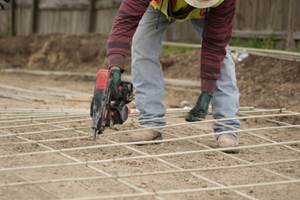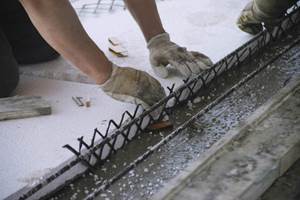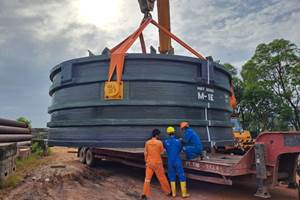Starrett launches force testing solution line
The L.S. Starrett Company has introduced a comprehensive line of innovative, entry level computer-based force testing solutions for applications.
Share
The L.S. Starrett Company (Athol, MA, US) has introduced a comprehensive line of innovative, entry level computer-based force testing solutions for applications ranging from load limit and distance testing to break limit, time average, cyclic count and duration testing and constant hold. Optimized for production and quality control testing, the versatile, innovative architecture of the L1 system is designed for reliable, fast, repeatable and easy operation according to Starrett.
The Starrett L1 line of force solutions consists of systems for Computer Controlled Force Measurement, Digital Force Gages, Starrett FMM Digital Force Tester Motorized Test Stands, Manual Test Stands and Load Cell Sensors.
"We are excited to offer the most advanced, innovative and easy-to-use line of testing solutions available," says Mr. Emerson Leme, head of Metrology Equipment Division at Starrett. "Users across many industries and applications will be impressed with the features, flexibility and modern design of the L1 force measurement platform, which is unprecedented in the industry."
Starrett L1 systems are computer-controlled testing systems designed for high-volume, in-situ production testing. Six models are available in standard and extended travels with testing capacities of 110 lbf, 330 lbf and 550 lbf. All L1 Systems feature a small footprint and are designed for lean manufacturing applications. Fill-in-the-blank templates let users create, perform, measure and analyze their test in seconds and perform limit testing, break testing, constant hold testing and cycle testing. A high resolution display shows results in tabular and graphical formats. Tolerances can be applied for immediate pass/fail indication. Raw data and results can be exported to Excel for reporting and statistical analysis. Load measurement accuracy is more than 0.1% while distance position accuracy is more than 20 microns.
Designed for basic tensile and compression testing, the Starrett Series DFC and DFG digital force gages can be used as handheld testing solution for basic applications, or via the DFC gage, as a force sensor and controller when used with the FMM Series of motorized stands or the MTL and MTH manual stands.
The DFC gage can be used as a traditional handheld instrument with a measurement accuracy of more than 0.1%. Or, the DFC can be used as a controller on the column of Starrett’s new FMM Series digital test stands. As a controller, the DFC serves as the user interface where users can setup load limit testing, distance limit testing and break testing. The DFC controls the FMM tester’s speed, travel distance and direction. The DFC displays both force and distance results and features Bluetooth, USB and RS-232 for interfacing to external devices including computers, printers and networks. The DFC Series is available in eight load capacities from 2lbf to 550lbf. All models have a measurement resolution of 10,000:1.
Three new manual testers are also available in the Starrett L1 Line: MTL-110 (110lbf), MTL-330 (330lbf) and the MTH-550 (550lbf). These testers are designed for applications where occasional testing is performed or where an economical solution is preferred. Combined with a DFC or DFG force gage, the user has a solution that delivers accurate results for tensile or compressive testing. Starrett manual testers can be used vertically or horizontally. Options include a digital scale for precise distance/height measurements.
Starrett BLC load cell sensors are full-bridge, temperature compensated strain gage instruments designed and optimized for basic force testing applications. These S-Beam sensors feature high axial stiffness and minimal deflection at full capacity, which leads to improved measurement accuracy.
When more sophisticated and complex testing is required, Starrett also offers a range solutions via the L2, S2, L2 Plus and L3 Systems. The Starrett L1 Force Measurement Line is manufactured in the US and is available in several configurations including FMM Series digital force testers in three standard travel and three extended travel versions, 14 digital force gages including eight DFC advanced force controllers and six DFG basic force controllers, eight load cell sensors in the Series BLC and three manually operated force testers including two models in the Series MTL and one model in the Series MTH.
Related Content
Gatorbar, NEG, ExxonMobil join forces for composite rebar
ExxonMobil’s Materia Proxima polyolefin thermoset resin systems and glass fiber from NEG-US is used to produce GatorBar, an industry-leading, glass fiber-reinforced composite rebar (GFRP).
Read MoreSGL Carbon carbon fiber enables German road bridge milestone
A 64-meter road bridge installed with carbon fiber reinforcement is said to feature a first in modern European bridge construction, in addition to reducing construction costs and CO2 emissions.
Read MoreComposites-reinforced concrete for sustainable data center construction
Metromont’s C-GRID-reinforced insulated precast concrete’s high strength, durability, light weight and ease of installation improve data center performance, construction time and sustainability.
Read MoreComposites end markets: Infrastructure and construction (2024)
Composites are increasingly used in applications like building facades, bridges, utility poles, wastewater treatment pipes, repair solutions and more.
Read MoreRead Next
Developing bonded composite repair for ships, offshore units
Bureau Veritas and industry partners issue guidelines and pave the way for certification via StrengthBond Offshore project.
Read MorePlant tour: Daher Shap’in TechCenter and composites production plant, Saint-Aignan-de-Grandlieu, France
Co-located R&D and production advance OOA thermosets, thermoplastics, welding, recycling and digital technologies for faster processing and certification of lighter, more sustainable composites.
Read MoreAll-recycled, needle-punched nonwoven CFRP slashes carbon footprint of Formula 2 seat
Dallara and Tenowo collaborate to produce a race-ready Formula 2 seat using recycled carbon fiber, reducing CO2 emissions by 97.5% compared to virgin materials.
Read More















.jpg;maxWidth=300;quality=90)










